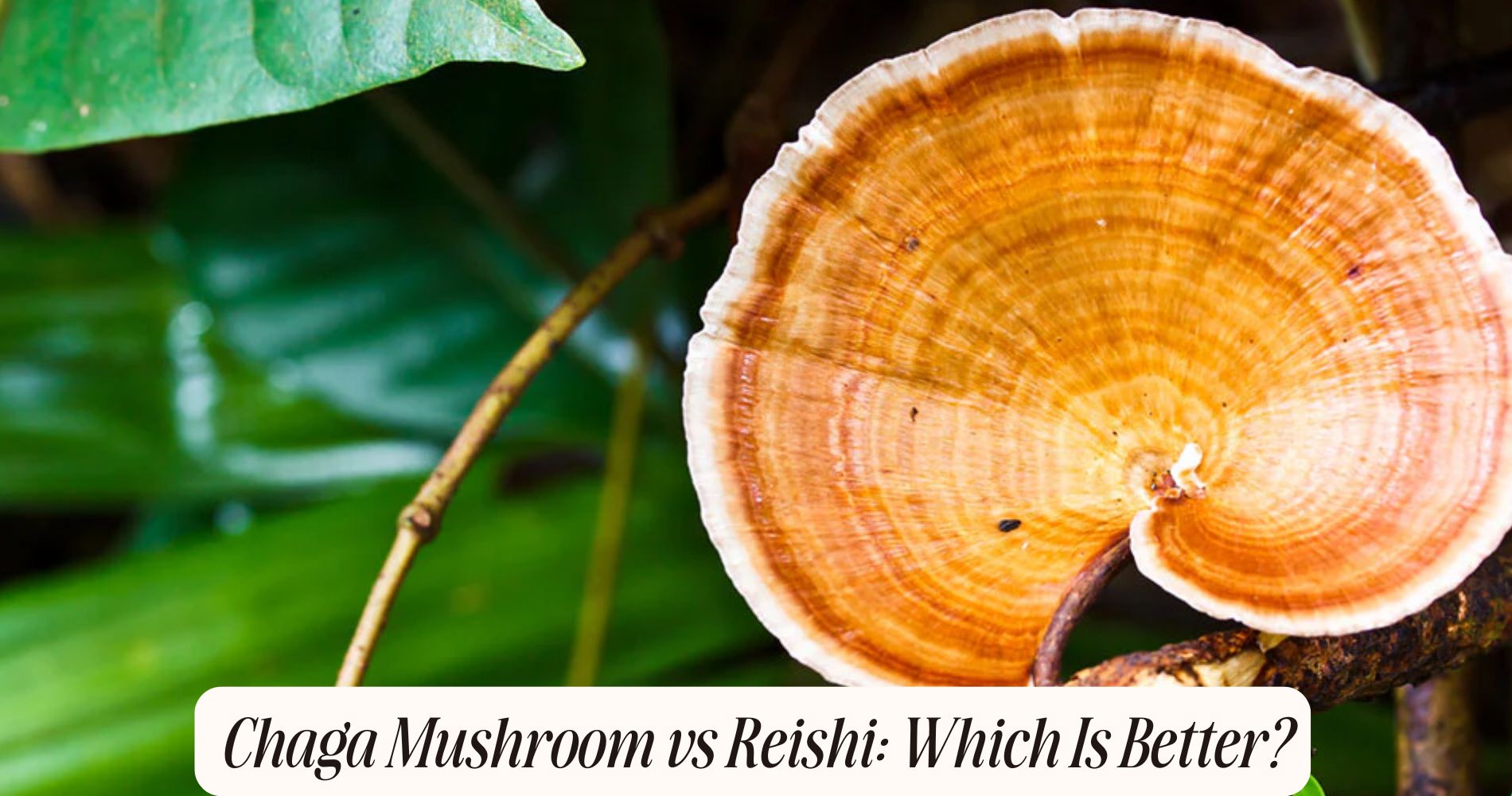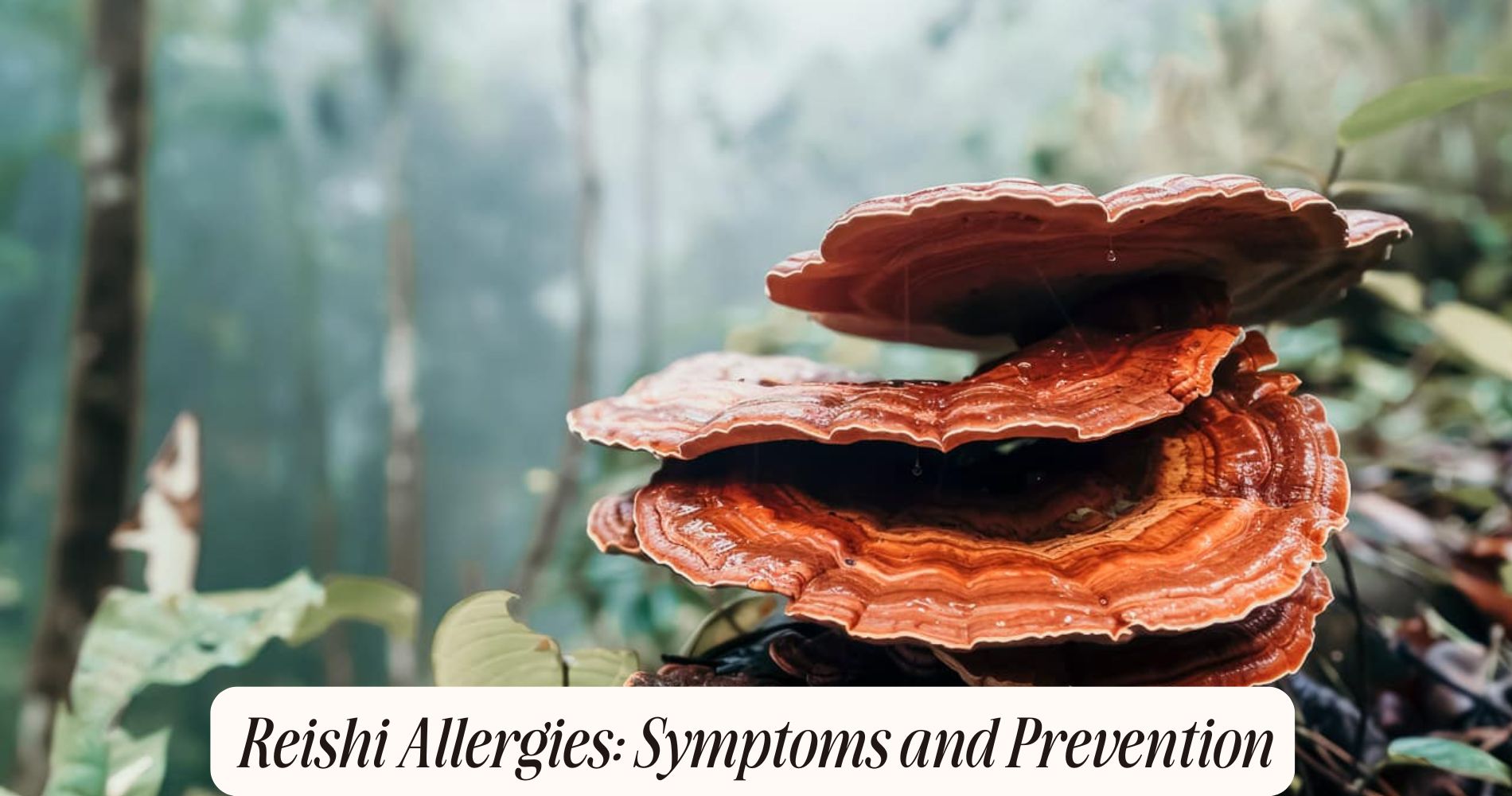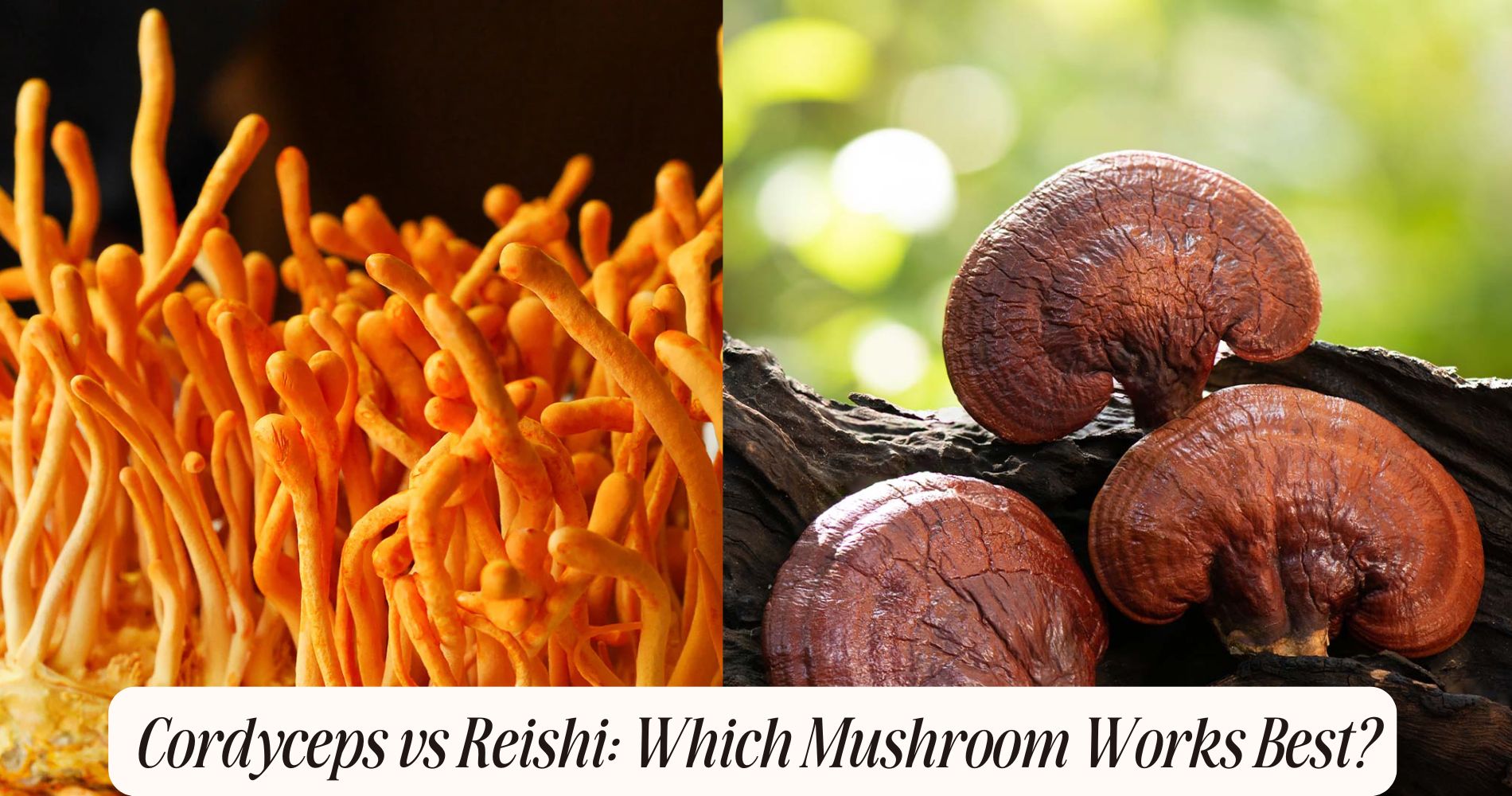
Chaga Mushroom vs Reishi: Which Is Better?
When comparing Chaga mushrooms and Reishi, it really comes down to your health goals. Chaga's rich antioxidant profile excels in boosting your immune system and providing anti-inflammatory benefits, making it great for overall wellness. On the other hand, Reishi is renowned for enhancing mental well-being and reducing stress, which may improve your sleep quality. Nutritionally, Chaga offers more minerals, while Reishi provides essential B vitamins for energy. Each has unique benefits and potential side effects, so it's crucial to reflect on your personal health needs before choosing one to incorporate into your routine. Explore further to uncover more insights on this topic.
Overview of Chaga Mushroom
Chaga mushroom, scientifically known as Inonotus obliquus, is a fungus that primarily grows on birch trees in cold climates, particularly in northern regions like Siberia, Canada, and parts of Europe.
When you're considering chaga sourcing, it's vital to guarantee you're obtaining high-quality specimens. The best chaga is harvested from living birch trees, as this confirms the highest concentration of beneficial compounds.
When sourcing, look for sustainably harvested products to support ecological balance.
Once you've sourced your chaga, the next step is chaga preparation. This fungus isn't typically consumed raw; instead, it's often dried and ground into a powder or made into a tea or tincture.

To prepare chaga tea, steep the dried chunks or powder in hot water for at least 30 minutes, allowing the water to extract its bioactive compounds. For tinctures, a longer extraction process using alcohol can enhance potency.
Whether you choose to brew tea or create a tincture, the preparation method you select influences the extraction efficiency of polysaccharides, antioxidants, and other beneficial constituents.
Therefore, understanding both sourcing and preparation is fundamental for maximizing chaga's health benefits.
Overview of Reishi Mushroom
Reishi mushroom, known scientifically as Ganoderma lucidum, has garnered attention for its extensive health benefits, including immune system support and stress reduction.
Traditionally, it's been used in Eastern medicine for centuries, often regarded as a tonic for longevity and energy.
Understanding its applications in both modern health practices and historical contexts can provide valuable insights into its significance.
Health Benefits of Reishi
Exploring the health benefits of the Reishi mushroom reveals its significant role in traditional medicine and modern wellness practices. Known as Ganoderma lucidum, Reishi is celebrated for its adaptogenic properties, helping your body adapt to stress.
Research indicates that Reishi extracts may enhance immune function, potentially increasing your resistance to infections and diseases.
One of the notable compounds in Reishi is triterpenes, which exhibit anti-inflammatory and antioxidant effects. These properties can contribute to improved cardiovascular health by reducing blood pressure and cholesterol levels.

Additionally, studies suggest that Reishi may support liver health, enhancing detoxification processes.
When considering reishi dosage, it's important to start with lower amounts, typically ranging from 1 to 3 grams of powdered extract per day, gradually increasing as needed. This allows you to gauge your body's response to the mushroom.
Traditional Uses and Applications
Historically revered as the "mushroom of immortality," Reishi has been a cornerstone in traditional Eastern medicine for centuries. You'll find that its applications range widely, often focusing on promoting longevity, enhancing liveliness, and supporting overall health.
Traditional medicine practitioners have utilized Reishi for its adaptogenic properties, which help the body manage stress and maintain homeostasis.
In herbal remedies, Reishi is frequently prepared as teas, tinctures, or powders. These forms enable you to harness its bioactive compounds, such as triterpenes and polysaccharides, which are believed to contribute to its immune-boosting and anti-inflammatory effects.
Many cultures have employed Reishi to address ailments like insomnia and fatigue, recognizing its potential to improve sleep quality and energy levels.
Additionally, Reishi's role as a natural mood enhancer has made it a popular choice in holistic therapies. You might consider incorporating it into your wellness routine, especially if you're exploring natural solutions for anxiety or chronic stress.
Health Benefits of Chaga
Chaga mushrooms offer significant health benefits, particularly in supporting your immune system through their bioactive compounds.
Their high antioxidant content helps combat oxidative stress, which can lead to chronic diseases.
Additionally, Chaga exhibits anti-inflammatory effects that may aid in reducing inflammation-related conditions, making it a valuable addition to your wellness routine.
Immune System Support
Immune system support is one of the most compelling health benefits attributed to Chaga mushroom. Research indicates that Chaga can markedly boost your immune response, primarily through its polysaccharides, particularly beta-glucans. These compounds play a significant role in modulating your immune system, enhancing the body's ability to fend off pathogens.
When you consume Chaga, you're not just adding nutrients; you're actively promoting immune enhancement. Studies suggest that the mushroom can stimulate the production of various immune cells, including macrophages and natural killer cells, which are essential in identifying and eliminating foreign invaders. This immune modulation helps maintain a balanced immune response, preventing overreactions that can lead to autoimmune disorders.

Additionally, Chaga contains triterpenes, compounds that possess anti-inflammatory properties. This aspect is critical for maintaining peak immune function, as chronic inflammation can weaken your immune defenses.
Antioxidant Properties
Packed with a rich array of antioxidants, Chaga mushroom stands out as an exceptional natural source for combating oxidative stress. Its unique composition includes polysaccharides, polyphenols, and melanin, all contributing to its potent antioxidant mechanisms. These compounds work synergistically to neutralize free radicals, which can lead to cellular damage and contribute to various chronic diseases.
When you consume Chaga, you're not just ingesting antioxidants; you're also enhancing your body's cellular protection. The mushroom's bioactive components help to bolster the body's defenses against oxidative damage, promoting healthier cellular function.
Research indicates that Chaga may increase the activity of endogenous antioxidant enzymes, such as superoxide dismutase, further amplifying its protective effects.
Additionally, the ability of Chaga to modulate oxidative stress extends beyond mere scavenging of free radicals. It also influences signaling pathways that regulate the expression of antioxidant genes, creating a long-term protective environment within your cells.
Therefore, by incorporating Chaga into your wellness routine, you're not only addressing immediate oxidative threats but also fortifying your body's resilience against future oxidative stress. This makes Chaga a formidable ally in promoting overall health and longevity.
Anti-Inflammatory Effects
The anti-inflammatory effects of Chaga mushroom are gaining attention for their potential to support overall health and combat chronic inflammation. Research indicates that Chaga is rich in anti-inflammatory compounds, such as betulinic acid and polysaccharides, which play an essential role in inflammation reduction.
These compounds work by modulating inflammatory pathways, effectively decreasing the production of pro-inflammatory cytokines and promoting the expression of anti-inflammatory markers.
When you incorporate Chaga into your diet, you may experience a decrease in symptoms associated with conditions like arthritis and inflammatory bowel disease. The mushroom's ability to inhibit the activation of nuclear factor-kappa B (NF-κB) is particularly significant, as this transcription factor is central to the inflammatory response.
By downregulating NF-κB, Chaga helps to mitigate chronic inflammation at a cellular level. Additionally, the antioxidant properties of Chaga complement its anti-inflammatory effects.
This dual action can enhance your body's resilience against oxidative stress, further supporting your overall health. As a result, Chaga mushroom not only offers a natural approach to inflammation reduction but also serves as a valuable addition to your wellness regimen.
Health Benefits of Reishi
Reishi mushrooms offer a range of health benefits that have garnered significant attention in both traditional and modern medicine. One of the most notable benefits is their potential to enhance immune function. Research indicates that reishi extracts can stimulate the activity of immune cells, including macrophages and natural killer cells, which are vital for combating pathogens.
Additionally, reishi is known for its stress-reducing properties. It contains adaptogenic compounds that help your body manage stress more effectively, promoting a sense of calm and well-being. This can be particularly beneficial if you're dealing with chronic stress or anxiety.

When considering reishi dosage, it's important to start with a low amount, typically around 1 to 2 grams of reishi extracts per day. You can gradually increase the dosage based on your individual response.
However, consulting a healthcare professional is advisable before incorporating any new supplement into your routine, especially if you're on medication or have underlying health issues.
Nutritional Profiles Comparison
Often overlooked, the nutritional profiles of chaga and reishi mushrooms reveal significant differences that can impact your health choices.
Chaga boasts a higher nutrient density, primarily due to its rich composition of antioxidants, polysaccharides, and triterpenes. These compounds contribute to its potential health-promoting properties, making it a popular choice for those seeking immune support and overall well-being.
On the other hand, reishi mushrooms are also nutrient-dense but differ in vitamin content. They contain notable levels of B vitamins, which are essential for energy metabolism and cognitive function.
While chaga provides fewer vitamins, it compensates with a higher concentration of minerals like potassium, calcium, and magnesium, which play vital roles in various bodily functions.
When comparing these two mushrooms, consider your specific health goals. If you prioritize antioxidants and mineral intake, chaga may be more suitable.
However, if you're looking for enhanced energy support and cognitive health, reishi's B vitamin profile might better meet your needs. Understanding these nutritional differences can help you make informed decisions tailored to your health requirements.
Potential Side Effects
When considering the potential side effects of chaga and reishi mushrooms, it's essential to examine their unique biochemical properties and how they interact with the body.
Both mushrooms contain compounds that may trigger side effects, particularly in sensitive individuals. For instance, chaga is rich in oxalates, which can lead to kidney issues if consumed excessively, especially for those predisposed to kidney stones.
On the other hand, reishi has been associated with gastrointestinal disturbances, such as nausea and diarrhea, particularly in high doses. Additionally, some users may experience allergic reactions to either mushroom, manifesting as skin rashes, itching, or respiratory issues.

If you have a history of allergies to fungi or molds, you should approach these mushrooms with caution.
It's important to note that both chaga and reishi can interact with medications, especially anticoagulants and immunosuppressants. You should consult a healthcare professional before incorporating them into your regimen, particularly if you have underlying health conditions or are taking medication.
Methods of Consumption
Numerous methods exist for consuming chaga and reishi mushrooms, each offering distinct advantages and considerations. One of the most popular preparation methods is brewing them into tea. For chaga, you can simmer the chunks or powder in hot water for 30 to 60 minutes to extract its beneficial compounds.
Reishi can also be brewed, but it often requires longer steeping times due to its tougher texture.
Another method is tincturing, where you soak the mushrooms in alcohol for several weeks. This process extracts concentrated bioactive compounds, allowing for easier dosage management.
When it comes to dosage recommendations, you generally want to start with about 1 to 2 grams of dried chaga or reishi per day, adjusting based on your body's response and desired effects.
Capsules and powders are also viable options, offering convenience for those with a busy lifestyle. If you choose this route, follow the manufacturer's dosage recommendations, usually around 500 to 1000 mg per serving.
Choosing the Right Mushroom
Choosing the right mushroom can markedly impact your health and wellness journey. When considering mushroom selection, it's essential to align your choice with your specific health goals. Chaga and Reishi mushrooms serve different purposes, which can influence your decision.
Chaga, rich in antioxidants and polysaccharides, is often sought for its immune-boosting and anti-inflammatory properties. If your health goals include enhancing your immune response or reducing inflammation, Chaga might be your ideal choice. Its high levels of betulinic acid also offer potential benefits for cardiovascular health.

On the other hand, Reishi is frequently associated with stress reduction and sleep improvement. Its triterpenes may help with anxiety and promote relaxation. If you're focused on mental well-being and seeking a natural way to manage stress, Reishi could be more beneficial for you.
Ultimately, your personal health goals will dictate which mushroom is better suited for you. Careful mushroom selection requires evaluating not just the benefits, but also how these align with your current health needs and lifestyle.
This strategic approach guarantees you maximize the potential benefits of either Chaga or Reishi in your health regimen.
Personal Health Considerations
Understanding personal health considerations is essential in determining whether Chaga or Reishi mushrooms are appropriate for your wellness journey. Both mushrooms offer unique health benefits, but aligning them with your personal goals and lifestyle factors is vital.
If you're targeting immune support, Chaga might be your go-to option, thanks to its high antioxidant content and potential anti-inflammatory properties. On the other hand, if your focus is on stress relief and improving sleep quality, Reishi could be more beneficial due to its adaptogenic qualities that help balance the body's response to stress.
Consider any pre-existing health conditions. For instance, Chaga may interact with certain medications, particularly those affecting blood sugar levels.
Similarly, Reishi can act as a blood thinner, which might pose risks if you're on anticoagulants.
Lastly, evaluate your dietary preferences and how these mushrooms fit within them. Whether you prefer teas, tinctures, or capsules can affect your choice as well.
Get the Best of Both Worlds with SUPER MUSHROOM GUMMIES
Can't decide between chaga mushroom vs reishi? With Well Gummies' SUPER MUSHROOM GUMMIES, you don't have to choose! These convenient gummies combine the power of 10 functional mushrooms, including both chaga and reishi, to fuel your brain, boost your immune system, and provide calm energy. With a delicious wild berry flavor and no jitters or crash, they offer a balanced way to enhance your wellness. Try them today for an easy, tasty way to enjoy the benefits of multiple mushrooms in one bite!
Frequently Asked Questions
Can Chaga and Reishi Mushrooms Be Combined in Supplements?
Yes, combining chaga and reishi mushrooms in supplements can enhance their health benefits. However, you should carefully follow dosage recommendations to guarantee safety and maximize efficacy while avoiding potential interactions between the two.
Are There Any Specific Dietary Restrictions for Using These Mushrooms?
When using these mushrooms, you should consider dosage recommendations and potential interactions with medications or health conditions. It's wise to consult a healthcare professional to guarantee safety and effectiveness tailored to your individual needs.
How Long Does It Take to See Health Benefits From These Mushrooms?
You'll notice health benefits from these mushrooms within a few weeks, but the health timeline varies based on individual response. Factors like dosage, consistency, and your body's unique chemistry play essential roles in effectiveness.
Can Children Safely Consume Chaga or Reishi Mushrooms?
When considering child safety with chaga or reishi mushrooms, consult a pediatrician. Dosage recommendations vary, so it's essential to guarantee proper amounts for children, minimizing potential side effects while maximizing any health benefits.
What Is the Best Time of Day to Take These Mushrooms?
The best time to take these mushrooms depends on your goals. Morning benefits include enhanced energy and focus, while evening effects promote relaxation and better sleep. Choose your timing based on what you want to achieve.
Conclusion
To summarize, both chaga and reishi mushrooms offer unique health benefits and nutritional profiles. Chaga's antioxidant properties may boost your immune system, while reishi is renowned for its calming effects and potential to enhance sleep quality. Your choice should depend on your specific health goals and any underlying conditions. Always consider personal health factors and consult a healthcare professional before incorporating either mushroom into your regimen to guarantee you're making the best choice for your well-being.




